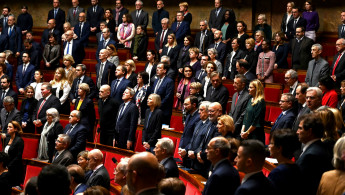France adopts resolution equating 'anti-Zionism' with 'antisemitism'
French lawmakers adopted the controversial bill, which was tabled by Paris MP Sylvain Maillard from Emmanuel Macron's La Republique en Marche centrist party, with 154 votes against 72.
The resolution adopts the definition issued by the International Holocaust Remembrance Alliance (IHRA), which states that some criticism of Israel could be anti-semitic.
"Anti-Zionist acts can sometimes obscure anti-semitic realities," the resolution says.
"Criticising the very existence of Israel as a collective composed of Jewish citizens is tantamount to hatred towards the Jewish community as a whole; just like collectively holding Jews accountable for the policies of the Israeli authorities is an expression of antisemitism," it adds.
"Such abuses increasingly make anti-Zionism 'one of the contemporary forms of antisemitism' in the words of the president of the republic."
Twitter Post
|
The resolution, like the IHRA definition, is careful to state that "pointing out such abuses in no way prevents otherwise free criticism of the Israeli government's policies and positions".
Critics - which include the government's human rights watchdog the Commission nationale consultative des droits de l'homme - believe this claim is questionable.
Dozens of Jewish intellectuals slammed the new French bill saying it "delegitimises the legitimate act of criticising the state of Israel", France 24 reported.
James Cohen, a Jewish professor at the Université Sorbonne Nouvelle Paris was one of 127 signatories of the petition, which he dubbed as "problematic".
"[…] by equating antizionism with anti-Semitism, you're broadening the definition of antisemitism too much […] you're going very far afield," he said in an interview to France 24.
"Some of the people out there who oppose the policies of the state of Israel, who may even oppose the existence of the state of Israel, might also be anti-Semitic […] but that should not delegitimise the legitimate act of criticising the policies of the state of Israel," he added.
"And when it comes to the existence of the state of Israel, there are questions that need to be asked whether a one-state solution or a two-state solution could be viable. Why should this discussion not be open?"
Follow us on Twitter and Instagram to stay connected





 Follow the Middle East's top stories in English at The New Arab on Google News
Follow the Middle East's top stories in English at The New Arab on Google News
![The UAE is widely suspected of arming the RSF militia [Getty]](/sites/default/files/styles/image_330x185/public/2024-11/GettyImages-472529908.jpg?h=69f2b9d0&itok=Yauw3YTG)
![Netanyahu furiously denounced the ICC [Getty]](/sites/default/files/styles/image_330x185/public/2024-11/GettyImages-2169352575.jpg?h=199d8c1f&itok=-vRiruf5)
![Both Hamas and the Palestinian Authority welcomed the ICC arrest warrants [Getty]](/sites/default/files/styles/image_330x185/public/2024-11/GettyImages-2178351173.jpg?h=199d8c1f&itok=TV858iVg)